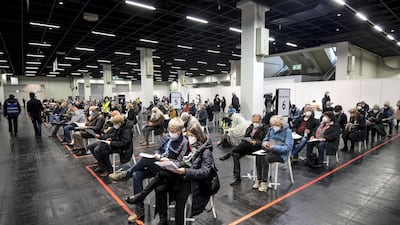Europe was divided over how to proceed with the AstraZeneca vaccine after regulators said they had found a possible link to very rare blood clots.
Safety experts at the European Medicines Agency (EMA) ruled on Wednesday that the clots should be listed as a very rare side-effect, but said the benefits of preventing Covid-19 still outweighed the risks.
Stella Kyriakides, the EU’s health commissioner, called for a “co-ordinated European approach” which “does not confuse citizens, and that does not fuel vaccine hesitancy”.
But an extraordinary meeting of Europe’s health ministers on Wednesday failed to reach an agreement on how EU governments should respond.
EU capitals are now issuing their own rulings, with some countries blocking younger people from having the vaccine because most of the reported blood clots have been in people under 60.
It follows weeks of back-and-forth over the shot, which was initially withheld from older people in countries including Germany and France because of separate doubts about the trial data.
The vaccine was suspended altogether in several EU countries last month after the first reports of blood clots emerged, before shots resumed after the EMA ruled they were safe and effective.
Spain and Italy said after the EMA’s latest findings on Wednesday that the vaccine would now be limited to over-60s, a policy which is already in place in Germany.
Belgium, meanwhile, set the age limit at 55, having previously had no restrictions on the use of the shot.
Sweden is maintaining its policy of only giving the vaccine to over-65s, while others, including Austria, are pressing ahead with no restrictions.
Outside the EU, Britain will now offer alternative vaccines to under-30s on the grounds that the risk of serious illness from Covid-19 is so small for young people that it does not clearly outweigh the risk of blood clots.
Young people in the UK – a country that has been vaccinating its population at a far faster rate than the EU – will receive either the Pfizer/BioNTech or Moderna vaccines instead.
In Australia, the vaccine will not be given to under-50s unless they have already had the first dose without any ill effects.
Portugal warned EU ministers that the latest ruling by the EMA was likely to affect public trust in vaccines, according to a letter seen by Reuters.
"Harmonisation at an EU level will be essential to stop the spread of misinformation," the letter added.
Despite the fears over blood clots in younger people, the EMA said on Wednesday that it could not confirm whether the risks were higher in certain age groups.
Safety experts said they had studied 62 cases of blood clots in the brain and 24 cases of clotting in the abdomen, leading to a total of 18 deaths.
The cases arose among 25 million people who had received the vaccine in Europe, including the UK.
The EMA said a "plausible explanation" for the blood clots was an immune response triggered by the vaccine.
But it held back from issuing a specific recommendation to EU governments, saying ministers in each country would have to assess the balance of risks themselves.
"We try to provide as much information as possible on the benefits and the risks we have identified,” said EMA director Emer Cooke.
“Based on that and the pandemic situation in a member state – the infection rate, the availability of different vaccines – the different member states can take different decisions on who to vaccinate," she said.
Ms Cooke said the risk of dying from Covid-19 was "much greater" than the risk of mortality from rare side effects.
"It is very important that we use the vaccines we have to try and beat this pandemic," she said.


